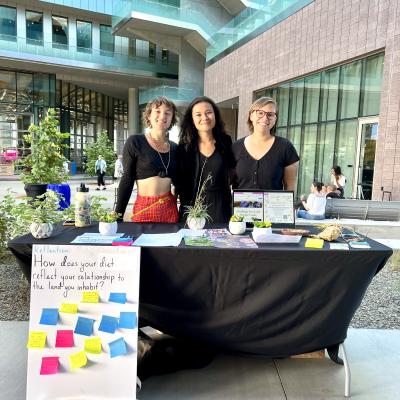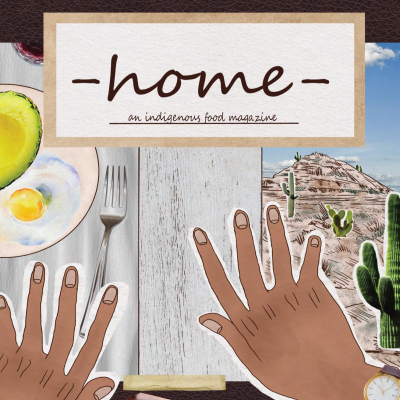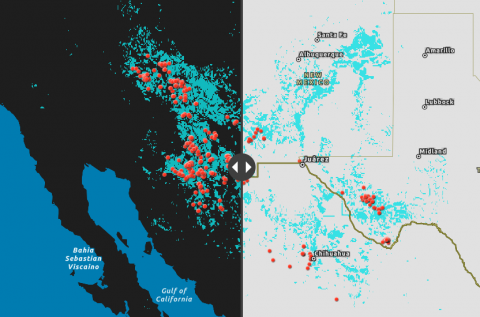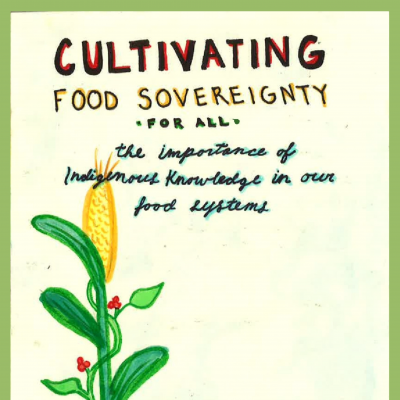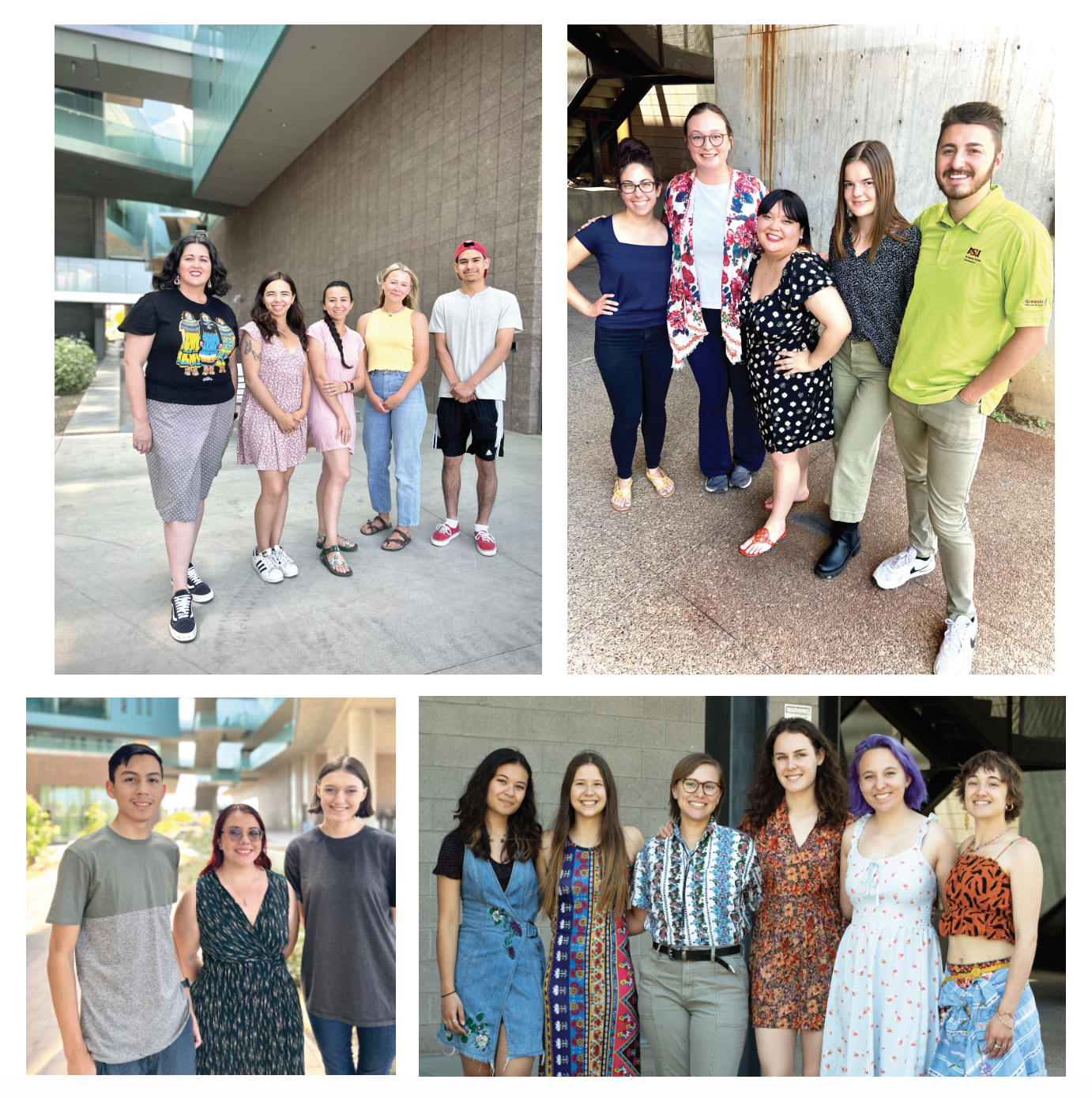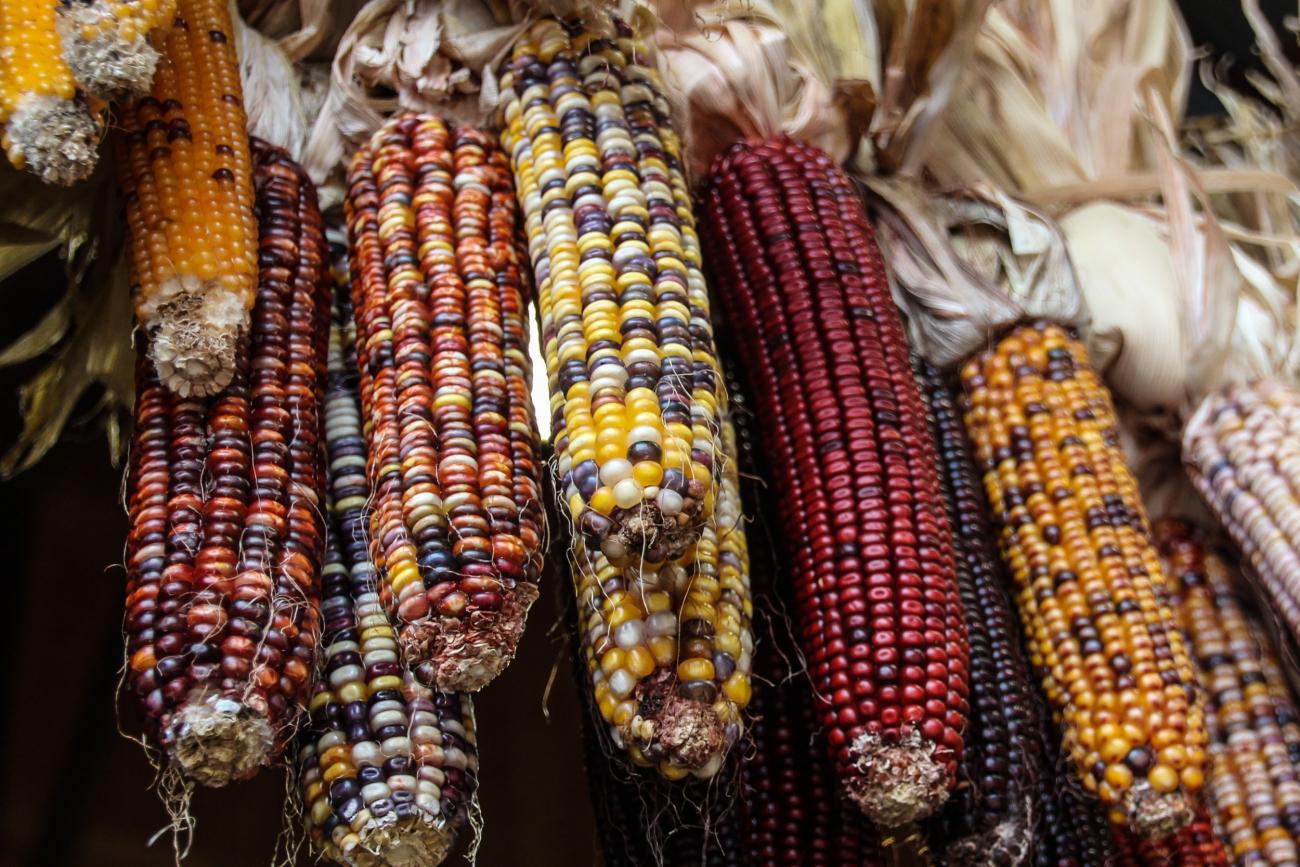
Indigenizing Food Systems Impact Outcomes
Indigenizing Food Systems
Students in the Indigenizing Food Systems Lab partnered with faculty from the Julie Ann Wrigley Global Futures Laboratory and the Labriola National American Indian Data Center to investigate what it means to "indigenize" modern food systems. Interdisciplinary student-faculty collaborations throughout the semester culminated into an Indigenous cooking demonstration event and a variety of student-led projects that all centered on questions regarding food sovereignty, Indigenous health, and sustainability.
Indigenous Chef Cooking Demonstration and Tasting Event
As part of the Julie Ann Wrigley Global Futures Laboratory's Earth Week celebration, the Indigenizing Food Systems Lab students and instructors hosted renowned chefs Dr. Lois Ellen Frank and Walter Whitewater for an immersive food exploration featuring cooking demonstrations, storytelling, and rich sensory experiences. Thanks in part to funding from the Global Futures Laboratory's Indigenous Knowledges Focal Area and several other sponsors, the event had the chefs prepare a tasting menu from which guests could try some of their acclaimed Indigenous-inspired, locally sourced dishes: hominy harvest stew and bison-stuffed New Mexico green chile.
Student Outcomes
Actualizing ASU's Land Acknowledgement and Uplifting Settler Consciousness
In response to ASU's Land Acknowledgement, a team of six students sought to further fulfill ASU's commitment to support Indigenous culture by creating a garden space at the Polytechnic Campus dedicated to cultivating Tohono O'odham Ke:li Ba:so melon and squash seeds during a public seed sowing event. They determined that a portion of the harvest from the garden space would be returned to the Tohono O'odham, Akimel O’odham, and Gila River communities. Additionally, they designed an interactive website that centers narratives around the sociocultural significance of the seeds and includes Indigenous recipes, planting guides, and Indigenous art.
O'odham Meal Box Project
Created and led from an O'odham/Indigenous student perspective, and sponsored by the Labriola National American Indian Data Center, the O’odham Meal Box Project supports Indigenous food sovereignty, health, and reconnection by increasing access to traditional O’odham food ways. The team's work also has an accompanying ASU Library Guide/ LibGuide featuring links to local Indigenous producers, chefs, restaurants, and other resources, including information about the O’odham people, and interviews with various Indigenous people who work with food. View their ASU Library LibGuide here.
Home
Conceptualized and published by a team of five sustainability students, Home is a magazine that explores the idea of "home" by showcasing personal stories and family recipes from across the globe. Aiming to increase exposure to traditional and cultural foods, especially those from Indigenous nations, the team collaborated with local chefs and international students to better understand how food, ritual, and belonging are interconnected. Flip through the April 2022 issue of Home here.
Chi'chil Countermap Project
Recognizing the inherent colonial connotations of modern political maps, a team of five students developed an interactive online countermap of Emory oak trees and their acorns (called “chi’chil” in the Western Apache language) that grow in the borderlands of US Southwest and Northern Mexico and are culturally and ecologically significant to Apache people throughout the area. View their ArcGIS storymap site here.
Indigenous Zine
A duo of sustainability students published a zine, a type of self-published magazine, that highlights the importance of traditional food for Indigenous health and culture. With conscientious reflections on the history of Indigenous peoples and interviews with cultural stakeholders, the zine prompts readers to recognize the value of Indigenous knowledge and traditions.
Econexiones: Indigenizing Food Series
In a cross-discipline collaboration, one student team produced a series of new episodes for Econexiones, a podcast focused on having holistic conversations around sustainability-related topics. For this "Indigenizing Food Series," they designed, planned, recorded, edited, published, and distributed three episodes related to the Indigenizing Food Systems Lab in which they shared food stories, discussed seed sovereignty and decolonizing education. View the series and the rest of the Econexiones podcast here or on any podcast platform.
Indigenous Food Systems
With guidance and support from Indigenous ASU faculty and librarians, this team of students created a resource guide designed to connect people with the history of the Southwest region and its peoples, highlight current Indigenous actors in the local food system, and to promote Indigenous futurities. View their ASU Library LibGuide here!
Grants
In order to earn the funds needed to initiate these projects, our Indigenizing Food Systems students applied for and received the following grants:
– Ashley Culbertson, Natalie Beyfuss, Andrea Castro, Cassidy Kyler, Bloom Sanchez, and Juniper Neff were awarded and Amplifier Mini-Grant for their Actualizing ASU's Land Acknowledgement and Uplifting Settler Consciousness outcome.
– Alycia de Mesa, Bianca Banuelos, Kevin Reza-Quirino, Janine Lopez-Fimbres, and Jenna Bryant were awarded an Amplifier Mini-Grant for their Chi'chil Countermap Project.
– Azita Martin, Haley Hernandez, Kirby Skoric, Stella Wick, and Kayla Napper were awarded an Amplifier Mini-Grant for their Home magazine outcome.
– Jordan Sene, Christy Pribish, and Juan "Anthony" Rosas were awarded an Amplifier Mini-Grant for their Econexiones: Indigenizing Food Systems Series outcome.
– Rachel Antidormi and Katie Halmekangas were awarded an Amplifier Mini-Grant for their Indigenous Zine outcome.
Collaborative Partners
- Amy Juan (Tohono O’odham), International Indian Treaty Council
- Jacob Butler (Onk Akimel O’odham) Community Garden Coordinator, Salt River Pima – Maricopa Indian Community
- Jacquelyn Ross (Pomo/Coast Miwok), University of California, Davis,
- Thosh Collins (Akimel O’Odham), Native Wellness
- Joseph Gazing Wolf (Lakota), ASU Ph.D. Student
- Dr. Lois Ellen Frank (Kiowa), Red Mesa Cuisine
Note: The views presented or expressed on this page are those of the speaker or author only and do not necessarily represent the views of Arizona State University.

